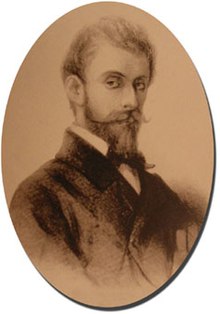Ernest Reyer
Louis-Etienne-Ernest Reyer (actually Rey , born December 1, 1823 in Marseille , † January 15, 1909 in Le Lavandou ) was a French composer and music critic . He wrote in the neo-romantic style and was particularly successful with operas.
Life
After an initial lesson with Barsotti at the Music School in Marseille, Reyer turned to the administrative career in Algeria . He worked from 1839 to 1848 as an employee of his uncle Louis Farrenc in the finance department of Constantine . In 1847, in addition to some smaller works, he composed a mass for the reception of the Duc d'Aumale in Algiers . Although his parents and uncle advised him not to pursue a musical career, he returned to France in 1848, where he began studying music under the guidance of his aunt, the piano professor Louise Farrenc . On April 5, 1850, his Ode Le Selam was performed in the Théâtre-Italy , which achieved great success. This later led to a close friendship with Hector Berlioz . From 1866 to 1909 he worked as a librarian at the Paris Opera and was a columnist at the Journal des Débats . He has written reports and reviews in various newspapers such as La Revue française , Le Courrier de Paris , La Presse and Le Moniteur universel . In 1875 he published some of these articles under the name Notes de Musique .
Reyer wrote mainly for the stage, and there are also dramatic traits in his other works. His compositional means are in the tradition of Hector Berlioz and Richard Wagner , which is particularly noticeable in the treatment of the orchestra and the use of leitmotifs. However, his musical style differs significantly from that of Wagner. He himself said that Wagner was the only composer who could write Wagnerian music. Due to his preference for foreign (exotic) themes such as in Le Sélam or his ballet Sacountalâ , he is considered a representative of musical exoticism . The latter and the opera Sigurd , which premiered in 1890, remained on the repertoire for a long time.
Works
Vocal works
- 40 vieilles chansons du XII au XVIII ème siècle , collected by Reyer, 1885
- 30 mélodies in two collections for voice and piano
- La Madeleine au désert , scene for baritone or low alto voice
- O Salutaris , 1928
- Redemption for voice and piano; Text: L. Bouilhet
- Le Sélam , oriental symphony. in 5 pictures for solos, choirs and orchestra; Text: Théophile Gautier ; Premiere : April 5, 1850, Paris, Théâtre-Italy
- L'hymne du Rhin , cantata for soprano and choir; Text: Joseph Méry ; 1865
- Mass pour l'arrivée du Duc d'Aumale à Alger , 1847
- Victoire , cantata, 1859 Paris, Opéra
Orchestral works
- Marche tzigane , after original motifs for orchestra, 1865 (1882)
Piano works
- Petite Fantaisie, alla moda antica , 1877
- Pensée mélodique
- Marche gaie , 1901
- Piece in style antique
Stage works
- Maître Wolfram ( Master Wolfram ), opéra comique in one act; Libretto: Joseph Méry and Théophile Gautier ; Premiere: May 20, 1854, Paris, Théâtre-Lyrique
- Sacountalâ , ballet pantomime in two acts; Libretto: Théophile Gautier; Premiere: July 14th 1858, Paris, Opéra
- La Statue , opéra comique in three acts; Libretto: Michel Carré and Jules Barbier ; Premiere: April 11, 1861, Paris, Théâtre-Lyrique
- Erostrate , opera in two acts; Libretto: Joseph Méry and Emilio Pacini ; Premiere: August 21, 1862, Baden-Baden; German translation by Draxler and Pasqué
- Au port ; opéra comique in one act; Libretto: Jules Ruelle and Gaston Escudier ; probably not listed
- Sigurd , opera in four acts; Libretto: Camille du Locle and Alfred Blau based on the Nibelungenlied ; Premiere: January 7th 1884, Brussels, Théâtre de la Monnaie
- Salammbô , opera in five acts; Libretto: Camille du Locle based on the novel by Gustave Flaubert ; Premiere: February 10, 1890, Brussels, Théâtre de la Monnaie
Fonts
- Notes de musique , 1875
- Quarante ans de musique , 1909
literature
- Guy Ferchault (trans .: Anna Frese) . In: Friedrich Blume (Hrsg.): The music in past and present (MGG). First edition, Volume 11 (Rasch - Schnyder von Wartensee). Bärenreiter / Metzler, Kassel et al. 1963, DNB 550439609 , Sp. 352-353 (= Digital Library Volume 60, pp. 62605-62607).
- Marc Honegger, Günther Massenkeil (ed.): The great lexicon of music. Volume 7: Randhartinger - Stewart. Updated special edition. Herder, Freiburg im Breisgau a. a. 1987, ISBN 3-451-20948-9 , p. 60.
Web links
- Ernest Reyer : Sheet music and audio files in the International Music Score Library Project
- List of the stage works by Ernest Reyer based on the MGG at Operone.
- REYER, Louis-Etienne-Ernest , entry in Enciclopedia Italiana (1936) on Treccani.it (Italian), accessed December 4, 2014.
Individual evidence
- ^ A b Hugh Macdonald: Reyer [Rey], (Louis-Etienne-) Ernest. In: Grove Music Online (English; subscription required).
| personal data | |
|---|---|
| SURNAME | Reyer, Ernest |
| ALTERNATIVE NAMES | Reyer, Louis-Etienne-Ernest (full name); Rey, Louis-Etienne-Ernest (real name) |
| BRIEF DESCRIPTION | French composer and music critic |
| DATE OF BIRTH | December 1, 1823 |
| PLACE OF BIRTH | Marseille |
| DATE OF DEATH | January 15, 1909 |
| Place of death | Le Lavandou |
